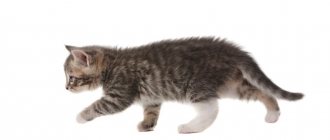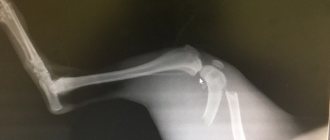Our understanding of cat well-being is sometimes too closely tied to our understanding of human well-being. In doing so, we underestimate the differences between humans and felines in terms of both physiology and psychology. This means we can look at certain symptoms in our cats and then make guesses based on the closest match to the health problem we may have.
If we ask ourselves why does my cat have hot ears, we might get worried. Although your veterinarian will be the only one who can make an accurate diagnosis, our site provides a possible reason why your cat's ears are hotter than usual. We will also show you the treatment options available in each scenario.
Why are my cat's ears hot?
If you notice that your cat's ears are hot to the touch, there is no need to worry. In fact, the first possible reason may be potentially obvious. If your cat has been sleeping in the sun or near a fireplace, it's understandable that this part of her body may be warmer than usual. If we want to understand whether a cat's warm ears are an alarming condition, we also need to look at other symptoms and possible behavioral changes.
© shutterstock
Cats can be reserved when it comes to problematic situations, often hiding when they feel bad. Knowing both the general habits of felines and the specific behavior of our cat will help us determine the cause. These may include:
- Exposure to a heat source : As we stated above, your cat could simply be lying next to a heat source, such as the sun or a radiator. Heat is transferred by convection from many objects (not the sun), but even a cat's paws can warm their ears. If they are sleeping and have their ears folded back with their paws, their own body heat may raise their temperature. In this case, you will see that your ears will soon cool down away from the heat source.
- Fever : One of the most common explanations for why a cat has hot ears is that they are suffering from a fever. This may be true to some extent, as a cat's immune response will increase their temperature, and their ears can be used to regulate it. However, a diagnosis of fever will only be issued once an accurate temperature reading has been obtained.
- Infection : When part of a cat's body is warmer than normal, it may mean an infection has occurred. If you notice that your cat's ears are hot, red, and acting strange, you will need to take them to the vet.
- Allergies : If your cat's ears are hot and red, this could also be the result of an allergic reaction. Allergens can be different, such as food, flea bites, fabrics, etc. The veterinarian will need to perform various tests to determine the specific allergens that are affecting the cat.
- Diseases : temperature changes may be caused by some specific ear diseases, for example, otitis media.
Normal condition
Ears are involved in thermoregulation and help cats cool their bodies. In some cases, an increase in temperature is normal and does not pose any danger:
- During active games;
- If the cat slept near the radiator or in the sun;
- Due to hot weather, when the body overheats;
- If a cat is cold, it may raise its body temperature, including its ears, to keep warm;
- During sleep and immediately after waking up;
- Under severe stress.
In all of the above situations, hot cat ears are a common occurrence and after some time their temperature should drop to normal values.
Does a cat with hot ears mean a fever?
As we already said, one of the main functions of a cat's ears is to regulate its body temperature. However, there is something else if we suspect that our cat has a fever. There are other symptoms of fever to watch out for in cats. A cat's paw pads are one of the few places on a feline's body where they can sweat. If you feel sweat (and not the cat's saliva licking its paws), then it may actually be a fever.
Another symptom that may indicate the presence of a fever is your cat's nose being dry and warm. However, if we want to know for sure that a cat has a fever, we need to have a vet take its temperature. A cat's normal body temperature is between 37.5ºC and 39.1ºC. If the temperature is a little higher, there may be a problem with the readings, but as soon as it rises above 39.8 ºC, a fever occurs.
© shutterstock
Is it dangerous
Hot ears in themselves are not a dangerous symptom. Hairless species have naturally hot ears; this is completely normal for them. Or rather, we feel that they are hotter because they have no fur. If the ears are hot, but the cat behaves as usual: eats, sleeps, goes to the litter box, plays, then there is no need to worry.
But if the behavior changes, the cat becomes lethargic, does not eat anything, goes to bed, or vice versa - runs around, meows restlessly, while her nose is dry and her ears are hot - this is an alarming symptom. She needs to be taken to the vet.
Hot ears really tell owners when a cat's temperature rises. Normal cat ears are pale pink or white. If they turn red, it means your blood pressure has increased. The temperature must be measured with a thermometer. First, the tip is lubricated with vegetable oil or Vaseline, and then carefully inserted 1 cm into the anus, the measurement duration is 3 minutes.
If the animal is worried, shakes and twitches its head in different directions, often raises its paws, scratches its ears, it is necessary to urgently examine the ears. This is not easy to do because of pain and irritation; usually the cat is worried and does not allow his ears to be touched. If there is a brown coating, lumps of dirt, or crusts from scratching, this is an ear mite.
Cat with hot ears: when to worry
In general, if your cat has hot ears but no other symptoms and they soon return to normal, there is little cause for concern. This is partly due to the fact that there are many blood vessels in a cat's ears. Their warm blood may circulate there, especially if they are trying to heat up their body, causing them to appear abnormally hot when everything is fine. As you can see from the readings above, a cat's normal body temperature is higher than ours, so they can only feel relatively warm.
If a cat does exhibit symptoms other than warm ears, we need to be careful. They may be overtired (sometimes hard to tell with cats), appear apathetic, aggressive, react poorly to stimuli, or change their normal behavior altogether; There's a good chance something is wrong. To resolve any doubts and initiate any treatment that may be required. It should be noted that Siamese and albino cats may be more sensitive to their ears, so you should be especially careful with these breeds.
How to help an animal
Many owners do not know what to do if the cat has a hot nose and ears, they begin to panic and give the pet antipyretics. However, doing this is strictly prohibited.
First, you need to measure the cat's general body temperature and monitor for other clinical signs. But there is no cause for concern if the pet does not have pain, remains active and retains its appetite. If the animal’s condition is normal, then you should calm the pet, give it water, and ventilate the room.
If, in addition to a hot nose and ears, other symptoms of disease are noticeable, and the cat has become lethargic and inactive, then you should contact a veterinarian and find out what to do next.










